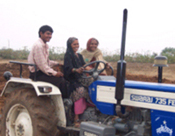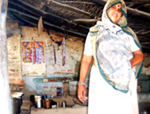|
What is Success ? New confidence, new capability, new strengths and every once in a while a genuine respect for that success is what success boils down to. The ones that command that respect are usually those who’ve been there and done that, seen it all going down and have come back to grab life by the throat and take their chances. Girija Devi The name Girija Devi seems to me as some sort of euphemism for strength, perseverance, confidence and a ‘never say die’ attitude. One of those people you keep hearing about before you actually end up meeting the individual in person - Girija Devi is a role model, a friend, a mother, a Holi-colour maker, a tractor driver and a crime fighter - all rolled in one. Born in a tiny village called Kai Pai, Girija was born and brought up in a very simple and modest (for rural India) surroundings. As with most women, she studied till Class Five and got married in a family at Maharajpura, where she continued to live as before and gave birth to a beautiful daughter. Things seemed fine till situations began to change at home. Strains of finance and marital discord began to surface, eventually driving her husband into committing suicide. Facing pressure from her in-laws about using "their" house, Girija was offered her late husband’s brother’s hand in marriage, which she accepted. After giving birth to a second child, this time a boy, her second husband decided to quit her for another woman, leaving her alone once again. This may not seem a grave tragedy on the face of it, but when we consider the societal attitude towards widows and divorcees, this issue might be put into perspective.
During her work with the scheme, she presented reports to the government regarding the various village issues and assisted with different drives and vaccination programmes in the village. Once on her way back home from a polio drive, she was accosted by a man who refused to let her pass and used force to keep Girija and her assistant from returning. This man demanded that Girija follow him but she resisted and managed to free herself. This incident marked a turning point in her life as the next day all hell broke loose. Determined to address most issues with one clean sweep, she demanded that the man should apologise to her in front of the whole village in the village Panchayat or else she would file a police report against the man. In order to save the reputation of the village, the Panchayat decided to go ahead with her demand. The decision was enforced and the man was made to apologise to Girija in front of the entire village. Respect, they say, comes from a combination of fear and love in varied proportions. There was no turning back for Girija. In the Year 2000, she joined a SHG with ten others, agreeing on a weekly saving of five rupees per person per week. Girija took her first loan in 2003, amounting to a meager figure of 2500 rupees, to which she added 8000 rupees of her own to initiate a goat farm. Since the momentum generated by her new self confidence was so immense, she took a second loan after repaying the first, this time for a much bigger amount of 20,000 rupees. But, why? Well, this loan was taken to start a department store, near the now famous Gaushala (run by her SHG) and the equally famous Chaadwari Mandir. Simultaneously, Girija is also working with her SHG, making Holi colours and pickles, managing a small plot of farmland in her village and driving a tractor as well as tilling the land at Gaushala, among other activities. Why is Girija such a success worth writing about? Well, because she stood up for what she believed in and worked hard with great perseverance and, most importantly, because right now she looks poised, calm and confident as she addresses 1500 women at a platform, explaining them the value of clean homes, good health and women empowerment. Maheshwari"Mommyji" As I sit behind Balbeer on his 175cc (really!) Rajdoot and sluggishly drive across Bundelkhand, my mind is thinking about somebody, whom everyone knows as Mommyji. Mommyji started her life pretty much like that of Girija. Married to a stone crusher at 14 in Bhojpura, she made her living running a small (and I mean really small) beedi, gutkha, tobacco shop near her husband’s work place. She is earning a little but not enough to feed her seven daughters and one son. Financial worries soon started escalating, but somewhere in the air there was this talk about SHGs and their advantages. Using the concepts of inter-loaning and micro credit to her advantage, she expanded her shop into two shops and a Dhaba and managed to get two of her daughters and one son married through her earnings. Right now, she’s making around five to six thousand rupees a month and preparing for the weddings of her remaining (five) daughters. So, we ride along and finally stop outside one of her "hotels" (which is what she calls her Dhaba/shop combination, lovingly). We talk for a while and I understand instantly why this woman is so loved and refers to as Mommy - she’s got a great open laughter and oodles of energy behind that chubby exterior, but most importantly she makes excellent roti-sabzi. So I ask her. Giving my by best smile, to tell me one of her favourite stories from her life. She doesn’t even need to think; quickly and eloquently, she starts to narrate a story about her time back in the days when she was a wild child. A new
Pujari (or priest) had been appointed to the village and he had been
perceived She burst into an irresistible laughter while I wondered how exactly could you tell someone so politely that you want to beat the daylights out of him. She is now much older since that day, maybe around 17 years older, but the spark and promise still linger on and they will continue to do so as long as she has this faith, I’m sure. q |
 After
leading a lonely life for long, opportunity came knocking at Girija’s
door in the form of a state government scheme called the Aanganwadi
Yojana, which aimed at providing employment at the village level, by
appointing local people for documentation purposes and as government
functionaries.
After
leading a lonely life for long, opportunity came knocking at Girija’s
door in the form of a state government scheme called the Aanganwadi
Yojana, which aimed at providing employment at the village level, by
appointing local people for documentation purposes and as government
functionaries. by the local community as being corrupt. Since the villagers had made
their intentions clear about getting rid of this mean man, he used his
influence and got the police to intimidate the villagers to accept him
as the village priest. Watching all this, she out stepped in front of
the police and snatched a baton from the hands of the nearest
cop. Mustering all the courage and energy required to face such an
onslaught, she politely told the police that this was her village and if
her people did not want the priest then he would be simply thrown out
and so would be the police, but not without being beaten to pulp.
by the local community as being corrupt. Since the villagers had made
their intentions clear about getting rid of this mean man, he used his
influence and got the police to intimidate the villagers to accept him
as the village priest. Watching all this, she out stepped in front of
the police and snatched a baton from the hands of the nearest
cop. Mustering all the courage and energy required to face such an
onslaught, she politely told the police that this was her village and if
her people did not want the priest then he would be simply thrown out
and so would be the police, but not without being beaten to pulp.